Main outcomes
Socioenvironmental responsibility
in programs and projects







Banco do Brasil Foundation considers the theme of sustainability as a central aspect of its performance.
The environmental dimension of the projects supported by BB Foundation combines economic development with environment preservation. The supported actions include environmental conservation and recovery initiatives.
The permanent search for the programs and projects carried out by BB Foundation to meet the criteria of socioenvironmental responsibility is included in our Sustainability Policy, with emphasis on the following aspects:
a) we identify and disseminate initiatives that promote community involvement, effective social transformation and the possibility of reapplying social technologies, at the local, regional or national level, encouraging ESG practices;
b) we link to the fulfillment of objectives and goals, the monitoring processes, the monitoring and evaluation of socioenvironmental projects, seeking effectiveness in our actions.
Environmental issues are considered both in the preparation of project selection notices and in the analysis of proposals from direct calls.
The selection of actions to be supported by BB Foundation takes into account requirements related to the principles of sustainability: Environmentally correct; Economically viable; Socially fair, and Culturally accepted.
The formalization instruments signed with the executing partners of the projects supported by the Foundation contain provisions that present, for example, the need for environmental licenses in a regular situation throughout their duration when it comes to actions carried out in areas of environmental interest.
Direct articulation projects approved in 2020
In 2020, most of the funds invested by Banco do Brasil Foundation were focused on actions to mitigate the impacts of the Coronavirus pandemic, bringing food and hygiene materials to more than 2 million people across the country. Resources were also invested in other humanitarian aid actions, such as the flooding in Minas Gerais and Espírito Santo in January 2020, the cyclone bomb in Santa Catarina in June/July and the blackout in Amapá in November. These actions were guided by concern for society and also mobilized small traders and farmers, who became suppliers of food, cleaning/hygiene materials, drinking water, among others, which made the execution of the actions feasible.
In addition to humanitarian aid, Banco do Brasil Foundation continued to work at the support of socioenvironmental projects, within the scope of its assistance to urban and rural communities, focused on the issues of education and income generation. Cooperation agreements were signed with non-profit institutions to carry out social actions in these areas, which include the following:

Education
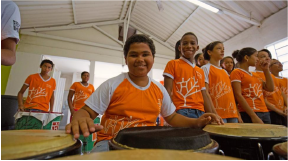
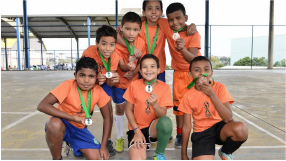
Projeto Árvore da Vida (Tree of Life Project)
Partnership between Banco do Brasil Foundation, Fiat Chrysler Automobiles - FCA and the Associação Voluntários para o Serviço Internacional (Association for International Service Volunteers) - AVSI Brasil, the project aims to reduce school dropout and improve the social capital of the community of Jardim Teresópolis in Betim/MG through the training of young people and local leaders.
The project's activities involve music classes and a human training workshop for 360 children and young people from Jardim Teresópolis’ community, referring young people to the learning market (young apprentice program), as well as the structuring of a coworking space and the training of 30 local leaders for the elaboration of community social projects.
With the project's resources, 10 social actions prepared by community leaders to serve the local community will also be supported.
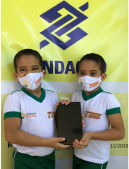
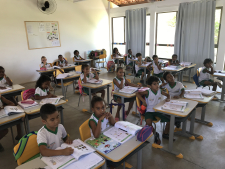
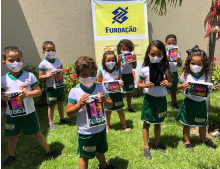
Projeto Conectados (Connected Project)
Initiative in partnership with Agrodan Social – Associação Sócio-Educacional, Cultural e Ambiental da Agrodan, (Socio-Educational, Cultural and Environmental Association of Agrodan) mango exporting company, headquartered in Belém de São Francisco (PE).
The company built and maintains Professora Olindina Roriz Dantas school, which currently serves 265 students from kindergarten to 7th grade of elementary school. The school operates full time and offers, in addition to curricular activities, art classes, English, Spanish, sports such as athletics and karate, dance, robotics, computer programming, theater, music, etc. Four meals a day and school transportation are also offered, which guarantees the attendance of children at school.
During the coronavirus pandemic and with the suspension of in-school classes, the school sought to adapt to the need for remote classes, however, not all students were able to participate due to the lack of internet access and computer equipment.
With the partnership of Banco do Brasil Foundation, tablets and notebooks were distributed to all students, as well as Internet access was available at their homes. In addition, a studio was set up to record the classes.
These equipments and contents will be used not only during the pandemic period, but will also help to improve the teaching tools (classes recorded for YouTube, meetings via Zoom, live broadcasts for different groups, among several other opportunities). It is understood that the tools for remote and online classes can improve the way of passing on the contents and facilitate the learning process even in the post-pandemic period, as tools complementary to face-to-face classes and home activities.

Generation of work and income
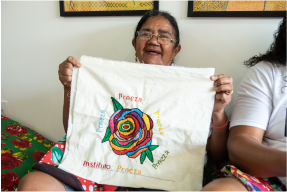
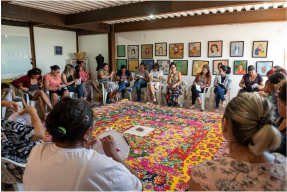
Projeto Tecendo o Amanhã (Weaving Tomorrow Project)
Partnership with Proeza Institute, based in Riacho Fundo, administrative region of DF. The institute carries out income generation projects, through the professionalization of women, as well as their inclusion in the productive segments of the economy, focusing on families in the Federal District.
The purpose of the project supported by Banco do Brasil Foundation is to promote income generation for women in vulnerable situations, through the development of a social business model.
One of Proeza’s Institute professional training activities is embroidery. Women in vulnerable situations attended at the institution receive training in embroidery and make various products that are mainly sold at fairs.
This marketing needs to be improved to become something more frequent, guaranteeing income for the women served. To this end, the project counts on the participation of designers and stylists who guide the production process by creating collections and promoting products.
One of the first collections developed in the scope of the project was the sneakers of Jorge Bischoff company. A donation of 300 sneakers was received to be embroidered by the project participants. These sneakers were marketed by Jorge Bischoff and the full sale price was passed on to the women who worked on the confection.
Crochet pieces are also being prepared to “cover” the Proeza Institute building, which is intended, at the end of the pandemic, to become a place for visiting and shopping, generating income for the women involved at the project.

Other assistance actions
for urban and rural communities


Campanha Pense Rosa (Think Pink Campaign)
Partnership between Banco do Brasil Foundation and the NGO Orientavida, the project aims to contribute to the early detection of breast cancer and ensure adequate and timely treatment for women in municipalities in the North, Northeast and Midwest, where there is a huge demand for diagnostic tests for breast cancer.
There is a consultation process with the health secretariats of the municipalities participating in the project, in order to make it possible to reduce the waiting list for mammography, offering to carry out the exams in private laboratories. In return, the Health Department ensures that women with positive results are included in the treatment provided by SUS (Universal Healthcare System of Brazil).
The target public of the project are women over 40 years of age, in a situation of vulnerability and awaiting diagnostic tests for breast cancer on SUS waiting list.
Women participating in the project are accompanied by Orientavida since their selection in the waiting list for the diagnostic exam, including complementary exams, if necessary, until psychosocial and legal advice for access to adequate and timely treatment by SUS.
3,000 women will be treated with mammography and other complementary exams, when applicable.
Social impacts observed in 2020
Coronavirus pandemic had a significant impact on the execution of socioenvironmental projects during the year 2020. Even so, some partners, with the necessary adaptations for the safety of the participants and professional teams, were able to maintain the functioning of the social and environmental projects that were already in progress, as a result of agreements signed with Banco do Brasil Foundation in previous years, obtaining positive results in transforming people's lives. The following are some examples:



Education
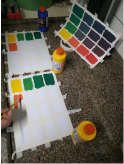
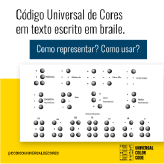

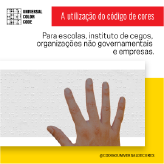
How to represent it? How to use it?
For schools, institutes for blind people,
NGOs and companies
Projeto Código Universal de Cores (Universal Color Code Project)
Initiative in line with the objective for social development - ODS04 - Educação de Qualidade: assegurar a educação inclusiva e equitativa de qualidade, e promover oportunidades de aprendizagem ao longo da vida para todos (Quality Education: ensuring inclusive and equitable quality education, and promoting lifelong learning opportunities for all), the project contributes to the inclusion of visually impaired people carried out in partnership with Instituto Legado de Empreendedorismo Social (Legacy Institute of Social Entrepreneurship) based in Paraná. The project aims to validate, standardize and disseminate the Universal Color Code system.
The Universal Color Code Project refers to a representation of embossed dots that allows color identification by color blind people, people with low vision and blind people. It is a concrete solution consisting of dots in reliefs such as Braille, and guarantees its application in textbooks, graphics, maps, teaching materials, drawings, as well as small and large pieces, such as toys, among others, generating a great range of applications, including the production of texts coupled with Braille writing. In view of the feeling of exclusion by people with visual impairments in contemporary society, in which the visual emphasis is emphasized by the color of things, the perception of Colors, from the Universal Code, becomes essential for these people. These people, when they are unable to recognize the colors, partially or totally, they feel excluded and dependent on third parties for their recognition.
The social investment of the Foundation to develop the activities was approximately BRL 150 thousand destined to execute, among other goals, the production of an interactive panel of the universal color code and the broadcasting of this panel in public places of high circulation of people, in addition to research on the usability of the code and the standardization and certification of the code based on the Braille system. There will be 60 direct participants and hundreds of indirect ones who can benefit from the code, the idea is to make it available to schools and other educational institutions.
Validation of the code is underway at the Ministry of Science, Technology and Innovations as well as the standardization by INMETRO (Brazilian National Institute of Metrology, Standardization and Industrial Quality).
Generation of Work and Income
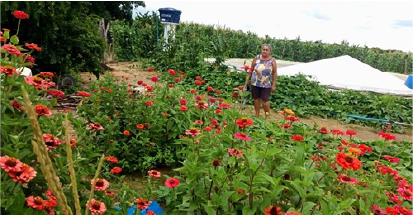
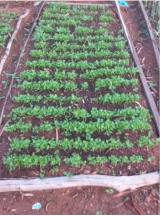
Projeto Mulheres Quilombolas e Seus Quintais Produtivos
(Quilombola Women and Their Productive Backyards Project)








In 2018/19, Banco do Brasil Foundation launched the Public Notice for the Reapplication of Social Technologies. One of the institutions qualified in this announcement was Associação Cristã de Base – ACB (Base Cristian Association), from Crato (CE), with a project whose objective was to improve the management and use of water resources in quilombola communities in the cities of Salitre, Araripe, Potengi and Porteiras.
The action was aimed at the implementation of the Cisternas Chapéu do Padre Cícero, Sistemas de Bioágua Familiar e Quintais Produtivos, (Padre Cícero’s Hat Cisterns, Family Bio-water and Productive Backyards Systems), in order to enable an increase in income and quality of life.
These social technologies are strategies for coexistence with the semi-arid region, being of significant importance for a resilient system for making water feasible for production and quality of life throughout the year, including in periods of drought, as they involve the capture of rainwater, reuse of water and agroecological production to guarantee food security and income generation for the families residing there.
70 integrated units of the Chapéu de Padre Cícero and Quintais Produtivos (Padre Cícero’s Hat Cisterns, Family Bio-water and Productive Backyards Systems) cisterns were implemented, and 25 bio-water systems in the region with the project's resources.
As a result of the implementation of social technologies and the provision of training, quilombola women are managing to maintain water throughout the year and, with productive backyards, they are already marketing their products, guaranteeing their food security and income generation.
The investment to serve about 100 quilombola women and their families was BRL 934 thousand.
Projeto do Campo ao Consumidor
(From the field to the consumer Project)
The Association of Neighborhoods of Rural Producers of Caconde and Region – Abapruc, was included in the Direct Call PIS BB/ BB Foundation/2019 to contribute to the economic and social development in the production of sustainable coffee for farmers in Caconde (SP). The investment of BRL 235 thousand benefited around 25 rural producers in the region with the acquisition of a tractor and a truck. This acquisition led to a significant increase in the extent of coffee cultivated area and the number of sacs/hectare of processed coffee.
The project enabled the implementation of a transition process from conventional agriculture to agroecological and organic systems. The use of the tractor during the cultural treatment period allows the adoption of good agricultural practices, without the application of herbicides. The truck dismissed the dependence on third parties in the transportation of inputs and in the flow of production, which, during the period of the pandemic and imposed sanitary restrictions, provided a greater volume of commercialized products.